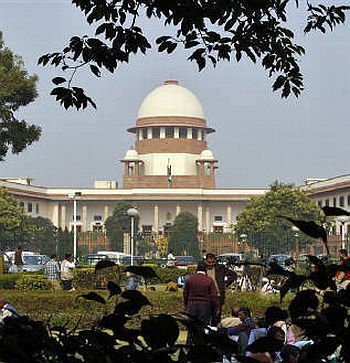 Long delay in disposing off mercy pleas by President or governor of persons convicted under anti-terror laws or similar statutes cannot be a ground for commutation of death sentence, the Supreme Court held on Friday.
Long delay in disposing off mercy pleas by President or governor of persons convicted under anti-terror laws or similar statutes cannot be a ground for commutation of death sentence, the Supreme Court held on Friday.
A two-judge bench of the apex court gave this landmark judgement while rejecting the plea of Khalistani terrorist and death row convict Devinderpal Singh Bhullar in a judgement that paves the way for his execution and can have a bearing on the fate of over 20 convicts facing execution.
Three persons are awaiting execution after conviction under Terrorist and Disruptive Activities in the Rajiv Gandhi assassination case while sandalwood smuggler Veerappan's associates are facing death in a Karnataka jail under the provisions of the same law.
Observing that India is one of the worst victims of terrorism, the apex court held that not to entertain the mercy plea of people convicted terrorist and other serious offences by the President or the governor cannot be characterised as arbitrary and the court cannot exercise power of judicial review only on the ground of undue delay.
The bench comprising bench of justices G S Singhvi and S J Mukhopadhaya said that the apex court's earlier judgements holding that long delay may be one of the grounds for commutation of the death sentence cannot be invoked in cases where a person is convicted for offence under TADA or similar statutes.
"We are also of the view that the rule enunciated in Sher Singh’s case, Triveniben’s case and some other judgements that long delay may be one of the grounds for commutation of the sentence of death into life imprisonment cannot be invoked in cases where a person is convicted for offence under TADA or similar statutes.
"Such cases stand on an altogether different plane and cannot be compared with murders committed due to personal animosity or over property and personal disputes," the apex court bench said.
The bench said that it is a "paradox" that people, who themselves had now shown any mercy while killing people, are pleading for mercy and pulled up activists for raising the issues of human rights of the terrorists who had not shown any respect for human lives.
They use bullets, bombs and other weapons of mass killing for achieving their perverted political and other goals or wage war against the state.
"While doing (killing) so, they do not show any respect for human lives. Before killing the victims, they do not think even for a second about the parents, wives, children and other near and dear ones of the victims.
The families of those killed suffer the agony for their entire life, apart from financial and other losses. It is paradoxical that the people who do not show any mercy or compassion for others plead for mercy and project delay in disposal mercy petition as a ground for commutation of the sentence of death," the bench said.











 © 2025
© 2025